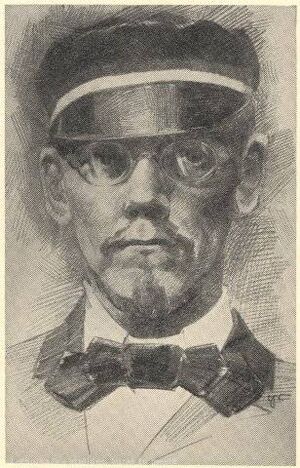Juris Alunāns facts for kids
Quick facts for kids
Juris Alunāns
|
|
|---|---|
 |
|
| Born | May 13, 1832 |
| Died | April 18, 1864 (aged 31) |
| Nationality | Latvian |
| Alma mater | University of Dorpat |
| Occupation | Writer, philologist |
|
Notable work
|
"Dziesmiņas, latviešu valodai pārtulkotas" (1856), "Sēta, daba, pasaule" |
| Movement | Young Latvians |
Juris Alunāns (born Gustavs Georgs Frīdrihs Alunāns) was a very important Latvian writer and language expert. He lived from May 13, 1832, to April 18, 1864. Juris Alunāns was one of the first people to help make the Latvian language stronger. He was also a key member of a group called the Young Latvians.
Alunāns created about 500 new words, called neologisms. Most of these words quickly became part of everyday Latvian. People still use them today!
Contents
Who Was Juris Alunāns?
Juris Alunāns was born in a place called Jaunkalsnava, which is now in Latvia. Back then, it was part of the Russian Empire. He grew up to be a writer and a philologist. A philologist is someone who studies language and old texts. They help understand how languages work and how they change over time.
Alunāns was very passionate about his native language. He wanted to make Latvian a modern and rich language. This was important because, at the time, German and Russian were often used more.
The Young Latvians Movement
Juris Alunāns was a leading figure in the Young Latvians movement. This was a group of young, educated Latvians. They wanted to celebrate Latvian culture and language. They also wanted more rights and respect for Latvian people.
The Young Latvians believed that a strong language was key. It would help Latvians feel proud of their heritage. They worked to develop Latvian literature and education.
Alunāns's Role in the Movement
Alunāns played a huge part in this movement. He used his skills as a writer and philologist. He helped create new words and translate important works. This made Latvian suitable for discussing many new topics.
He showed that Latvian could be a language of science, art, and politics. His work helped build a strong foundation. This foundation was for modern Latvian culture and identity.
His Contributions to the Latvian Language
Juris Alunāns is most famous for his work with words. He understood that Latvian needed new words. These words were needed for new ideas and concepts. He created many of these new words himself.
He often took words from other languages. Then he changed them to fit Latvian grammar and sounds. This process is how many languages grow and adapt.
Creating New Words (Neologisms)
Alunāns's new words are called neologisms. He created around 500 of them. Many of these words are still used daily in Latvia. For example, he helped create words for "history" (vēsture) and "nation" (tauta).
Before Alunāns, these ideas might have been expressed differently. His work made the language more precise. It also made it easier for people to talk about complex ideas.
"Dziesmiņas, latviešu valodai pārtulkotas"
One of his most important works was a collection of poems. It was called "Dziesmiņas, latviešu valodai pārtulkotas." This means "Little Songs, Translated into the Latvian Language." He published it in 1856.
In this book, he translated poems from other languages. But he did more than just translate. He made sure the translations sounded natural in Latvian. This helped show how beautiful and capable the Latvian language was.
Alunāns's Legacy
Juris Alunāns died at a young age, only 31 years old. However, his impact on Latvia was huge. He helped spark a national awakening. This was a time when Latvians started to feel a stronger sense of identity.
His work laid the groundwork for future Latvian writers. It also helped preserve and develop the language. Today, he is remembered as a national hero. He is celebrated for his dedication to the Latvian language and people.
 | Mary Eliza Mahoney |
 | Susie King Taylor |
 | Ida Gray |
 | Eliza Ann Grier |

